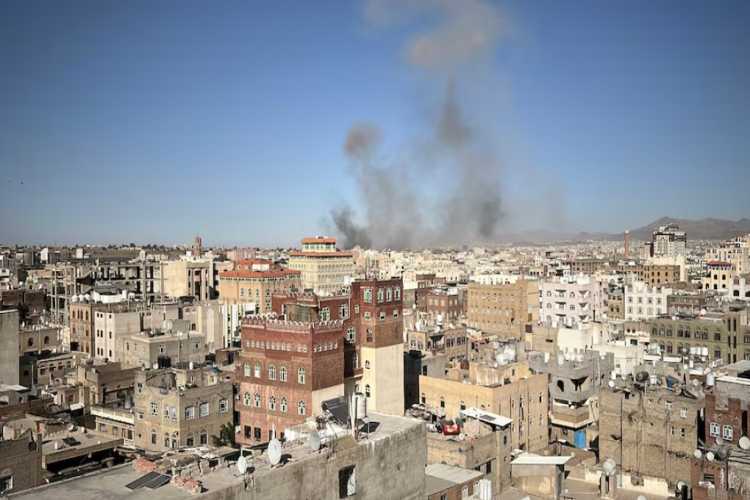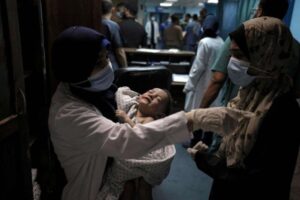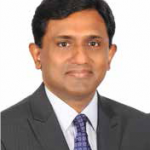
Public health during conflicts: The recent attack on Sana’s International Airport by the Israeli defence forces while World Health Organisation Director-General Tedros Adhanom Ghebreyesus and a UN delegation were present is an alarming affront to global norms of humanitarian protection. The attack, which killed three civilians and injured others, is not just a tragic event but a stark reminder of the escalating trend of violence targeting health workers, facilities, and institutions in conflict zones. Dr Tedros, along with UN Resident Coordinator Julien Harneis and other personnel, narrowly escaped harm. However, the incident exposes the systemic disregard for the protections enshrined in international humanitarian law.
The attack not only endangers the lives of those dedicated to saving others but also jeopardises the fragile healthcare systems in conflict-affected regions. The deliberate nature of this strike, targeting a civilian airport and a marked UN aircraft, raises grave concerns about the motives behind such actions. It also reflects the broader challenges faced by humanitarian actors operating in volatile environments, where their neutrality is increasingly disregarded.
READ | India’s textile industry: Policy directions for and challenges ahead
Brazen violation of international norms
The attack on Sana’a International Airport exemplifies the erosion of international humanitarian law, which explicitly safeguards health workers, facilities, and patients during armed conflicts. The Geneva Conventions, along with UN resolutions, establish clear mandates for the protection of humanitarian operations. Yet, such incidents expose the fragility of these protections in practice. By targeting a known hub for humanitarian activities, the Israeli forces demonstrated a troubling willingness to flout these norms.
The consequences of such actions extend beyond immediate casualties. The Sana’a attack disrupted a critical transit point for humanitarian operations in northern Yemen, a region already grappling with severe humanitarian needs. With over 18 million people requiring assistance, and projections suggesting that number will exceed 19 million by 2025, the paralysis of such vital infrastructure exacerbates an already dire situation. Furthermore, the timing of the attack, coinciding with the global media’s year-end lull, suggests a calculated effort to minimise international scrutiny and condemnation.
Health workers as targets
The attack on Sana’a is not an isolated event but part of a disturbing global trend of violence against health workers and facilities. Data from organisations like WHO and the Safeguarding Health in Conflict Coalition (SHCC) reveal a significant increase in such incidents. In 2023, 480 health workers were killed in conflict zones, nearly double the previous year’s toll. Between January and September 2024, WHO recorded nearly 700 attacks on healthcare facilities and staff in Ukraine and the Occupied Palestinian Territory alone, resulting in over 500 injuries and nearly 200 deaths.

These attacks have catastrophic implications for healthcare systems and the communities they serve. For instance, in Gaza, over 84% of health facilities were damaged or destroyed by early 2024, leaving millions without access to essential medical care. The impact of such destruction extends beyond immediate injuries and fatalities. Chronic conditions go untreated, disease outbreaks become unmanageable, and communities lose critical points of refuge and stability. The psychological toll on health workers operating under constant threat further diminishes the quality of care available in these regions.
Motivations behind attacks
The targeted attack on Dr Tedros and the UN delegation reflects deeper geopolitical tensions and motivations. The Israeli-Palestinian conflict, now spilling into neighbouring regions like Yemen, has created an environment where humanitarian actors are increasingly viewed as adversaries rather than neutral entities. WHO’s documentation of attacks on healthcare facilities in Gaza and its advocacy for accountability may have made it a target of Israeli ire. This is compounded by shifting global political dynamics, such as the incoming U.S. administration’s historical antagonism toward WHO, which may have emboldened such actions.
The calculated nature of the attack on Sana’a suggests an intent to send a broader message. By targeting a high-profile figure like Dr Tedros, Israel demonstrated a blatant disregard for the international community’s principles and institutions. The muted response from key global actors, including the UN Secretary-General, further highlights the systemic failures in holding perpetrators accountable.
Reaffirming the sanctity of health
Addressing the growing crisis of attacks on health workers and facilities requires decisive and collective action from the international community. Strengthening accountability mechanisms is paramount. Bodies like the International Criminal Court (ICC) must actively investigate and prosecute violations of international humanitarian law. The recent ICC arrest warrant against Israeli Prime Minister Benjamin Netanyahu for war crimes, including attacks on healthcare facilities, is a step in the right direction but must be accompanied by broader enforcement measures.
Global institutions like the UN Security Council must also play a proactive role. Algeria, currently holding the council’s presidency, has an opportunity to prioritise the protection of health workers in conflict zones. A formal investigation into the Sana’a attack and its implications for international peace and security should be initiated. Beyond legal recourse, the global health community must break its silence and unequivocally condemn such acts. Health care must be recognised as a non-negotiable right, and attacks on health workers must be treated as direct assaults on humanity itself.
Dr Tedros’s call for an end to attacks on health workers must resonate beyond the corridors of WHO. Such violence undermines the fundamental principle that health is a bridge to peace and stability. Every hospital bombed and every health worker killed is not just a loss to the affected community but a step backward in the pursuit of global health equity and justice.
The WHO Constitution asserts, “The health of all peoples is fundamental to the attainment of peace and security.” Upholding this principle requires collective action from states, global institutions, and civil society. Protecting health workers is not just a legal obligation but a moral imperative.
The attack on Sana’a International Airport is a wake-up call for the world. Failure to act decisively now risks normalising violence against health workers and undermining the very fabric of international humanitarian law. The global community must ensure that health care remains a sanctuary, even in the darkest times of conflict, for the sake of humanity’s shared future.
Dr Joe Thomas is Global Public Health Chair at Sustainable Policy Solutions Foundation, a policy think tank based in New Delhi. He is also Professor of Public Health at Institute of Health and Management, Victoria, Australia. Opinions expressed in this article are personal.

